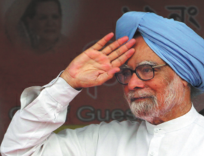India's former PM Singh dies at 92

NEW DELHI — Former Indian prime minister and veteran leader of India's main opposition Congress party Manmohan Singh died at 92 on Thursday after a prolonged illness, health officials said.
Singh served two consecutive terms as prime minister from 2004 to 2014, leading a coalition government under the Congress party-led United Progressive Alliance.
India announced seven days of state mourning on Friday after the death of Singh.
"As a mark of respect for the departed dignitary, it has been decided that seven days of state mourning will be observed throughout India," the Indian government said in a statement on Friday.
India's cricket team battling hosts Australia took to the ground in Melbourne on Friday with black armbands to show respect for Singh.
The official date for the state funeral was not announced immediately but a senior member of the Congress party suggested it would be held on Saturday.
China expressed deep condolences over the passing of Singh and extended sincere sympathies to the Indian government and its people as well as Singh's families, Foreign Ministry spokeswoman Mao Ning said on Friday.
Calling Singh a senior statesman and a renowned economist, Mao lauded the former Indian prime minister for his positive contribution to the development of bilateral ties.
During his tenure as prime minister, China and India announced the establishment of a strategic and cooperative partnership for peace and prosperity and reached a consensus on the political guiding principles for resolving the boundary question, Mao told a news conference.
Singh had been considered the architect of India's economic liberalization in 1991 when he was the country's finance minister. As a renowned economist and statesman, he had been staying away from politics in recent years due to health reasons and was not keeping well since the beginning of this year.
Born in 1932, Singh studied economics to find a way to eradicate poverty in the nation.
He won scholarships to attend Cambridge University, where he obtained a first in economics, and Oxford University, where he completed his doctorate.
Singh worked in a string of senior civil service posts, served as a central bank governor and held various jobs with global agencies such as the United Nations.
He was tapped in 1991 to reel India back from the worst financial crisis in its modern history.
Singh steered the economy through a period of 9 percent growth in his first term, lending India the international clout it had long sought.
Zhao Jia in Beijing contributed to this story.
Agencies - Xinhua

Today's Top News
- Macao SAR holds flag-raising, reception to mark 26th anniversary of return to motherland
- China issues rules to regulate pricing practices of internet platforms
- US hits over 70 IS-linked targets in Syria in massive retaliatory strikes
- Technological innovation brings cultural heritage alive
- Consumption to play bigger part in growth
- Opposition moves to impeach Lai






























